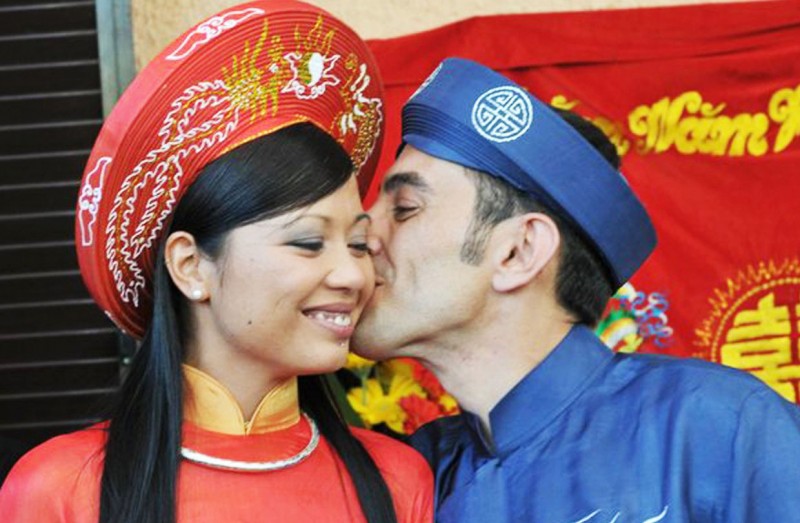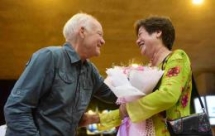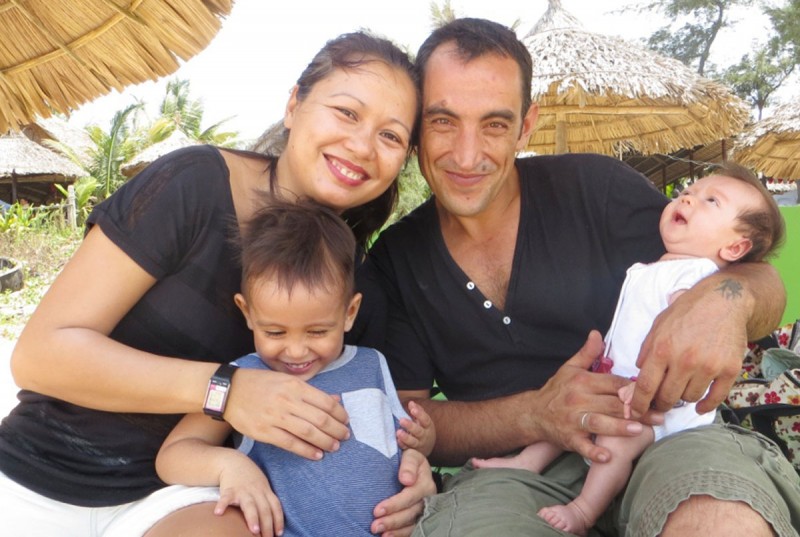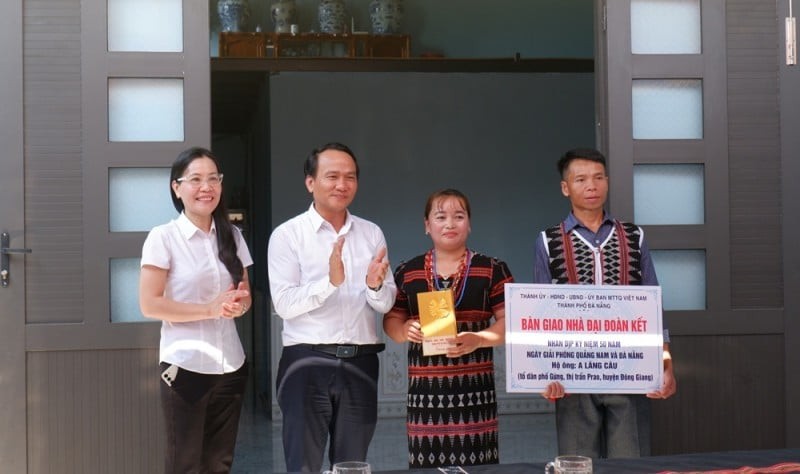Love brings Italian archeologist, wife to Hoi An
| Taiwanese man spreads love to poor children in Vietnam | |
| Former G.I., Vietnamese lover reunited in Saigon after 50 years apart | |
| South Korean nationals and their special love for Da Nang |
 |
| Italian Federico Barocco and his Vietnamese-French wife Dao Thu Thanh wear the ‘ao dai’ on their wedding day in France. Photo courtesy of Barocco |
An Italian archeologist working in Vietnam is so in love with Hoi An, a city in the central province of Quang Nam home to a UNESCO-recognized ancient town, that he has persuaded his fiancée to leave France to permanently settle here.
Federico Barocco was a working archeologist in Laos as part of a UNESCO project.
In 2001, he was reassigned to Vietnam.
His passion for Vietnamese archeological culture grew so strong he decided to open a restaurant featuring the antiquities he had collected for decades.
A personal ‘museum’ of Vietnamese culture
The Baroccos were the first foreign family to purchase a home in Hoi An Ancient Town.
Rico, as people would call him, elaborated on his collection of pottery products, antique objects, and items from the old days that he had accumulated for years when talking to your correspondent.
They are now on display at his restaurant at 36 Tran Phu Street in Hoi An Ancient Town.
His fluent Vietnamese might surprise any local.
“I am European, but now my soul belongs in Vietnam. It hurts me deep down to see so many Vietnamese selling off the antiquities that testify to their own ancestry and origin,” he said.
“I spent all of my money on collecting these old things [so] I will be able to tell tourists and Vietnamese youths who visit my place in the future the stories behind these items.”
He has a full cupboard housing ceramic products from the days of the Champa kingdom, which ruled over southern Vietnam until the early 19th century, when it was annexed into Vietnamese territory.
“I love it here. Hoi An is almost too peaceful and ideal for my family. We go to work and take the kids to school, and each day is filled with happiness,” Rico added.
“From what I’ve read, many Italian merchants who came to Hoi An to trade have been laid to rest here after they died. When I get old and depart this life, I want to rest in Hoi An’s soil just like them.”
In his restaurant, there is a manual scale made of steel sitting neatly in a corner. Below it is a lunch tray carved out of wood.
Elsewhere, he displays a wooden mold traditionally used for making ‘banh duc,’ a Vietnamese rice powder sponge cake.
“I rent this place from a local. One of its first owners was a Chinese baker,” Rico talked about his restaurant.
“On the floor, we can still see the imprint of the old kitchen. The ancient floor tiles are still intact.”
|
‘If you love me, come to Hoi An with me’
In 2009, Rico fell in love with Dao Thu Thanh, a Vietnamese-French woman.
Their courtship began on a field trip to Cu Lao Cham, a small islet located 15 kilometers off the east of Hoi An.
As his team was readying for the journey, he noticed a French family trying to figure out the way to the same destination.
Tourism was not so thriving in Hoi An around that time, so sea travel to Cu Lao Cham was few and far between.
Rico was moved by the family’s yearning to see the archeological beauty of the Cham people on the islet, so he and his team agreed to let them on board.
On this very voyage, the man found his other half.
Dao Thu Thanh was born in Vietnam but has lived in France since she was two years old.
Their love blossomed after the trip.
“I phoned her every day. She said we could settle in Europe, but I told her that despite my European looks, my heart was already in Hoi An,” he said.
“I told her, ‘if you love me, come to Hoi An with me.’”
His vision for a family life was a tiny cottage in the suburbs where their children would grow up surrounded by wonderful landscapes.
As the wedding approached, Rico browsed all over Hoi An to find the best ‘ao dai,’ a Vietnamese long gown worn by brides and grooms on their wedding day, for both of them.
He also searched for betel and areca, small fruits to offer as betrothal gifts to the in-laws as per Vietnamese tradition.
They held a genuine Vietnamese-style wedding reception in France, with the bride and groom both wearing the ao dai and the Vietnamese words ‘song hi’ (double happiness) written in beautiful calligraphy hanging in the background.
Though Thanh was sad to part with her family in France, she is content with the new life in her fatherland.
Thanh now runs the restaurant while Rico pursues his archeological career./.
Recommended
 Handbook
Handbook
Vietnam Moves Up 8 Places In World Happiness Index
 Handbook
Handbook
Travelling Vietnam Through French Artist's Children Book
 Multimedia
Multimedia
Vietnamese Turmeric Fish among Best Asian Dishes: TasteAtlas
 Handbook
Handbook
From Lost to Found: German Tourist Thanks Vietnamese Police for Returning His Bag
Popular article
 Handbook
Handbook
Prediction and Resolution for the Disasters of Humanity
 Handbook
Handbook
16 French Films To Be Shown For Free During Tet Holiday In Vietnam
 Handbook
Handbook
Unique Cultural and Religious Activities to Welcome Year of the Snake
 Handbook
Handbook











